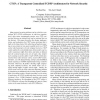Free Online Productivity Tools
i2Speak
i2Symbol
i2OCR
iTex2Img
iWeb2Print
iWeb2Shot
i2Type
iPdf2Split
iPdf2Merge
i2Bopomofo
i2Arabic
i2Style
i2Image
i2PDF
iLatex2Rtf
Sci2ools
ACSAC
2004
IEEE
2004
IEEE
CTCP: A Transparent Centralized TCP/IP Architecture for Network Security
Many network security problems can be solved in a centralized TCP (CTCP) architecture, in which an organization's edge router transparently proxies every TCP connection between an internal host and an external host on the Internet. This paper describes the design, implementation, and evaluation of a CTCP router prototype that is built on the Linux kernel. By redirecting all packets targeting at non-existent or non-open-to-public ports to a CTCP socket which pretends to be the original receivers, CTCP could confirm the real identification of the packet sources, collect suspicious traffic from them, and make an illusion that the scanned target ports are all open, thus renders port scanning an useless effort. Under CTCP architecture, external hosts only interacts with a secure CTCP router; therefore, any OS fingerprinting attempt and DoS/DDoS attack targeting at TCP/IP implementation bugs could be thwarted. Moreover, By further checking traffic originating from confirmed scanners, t...
| Added | 20 Aug 2010 |
| Updated | 20 Aug 2010 |
| Type | Conference |
| Year | 2004 |
| Where | ACSAC |
| Authors | Fu-Hau Hsu, Tzi-cker Chiueh |
Comments (0)

